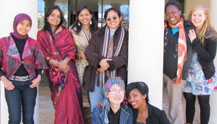 |
Participating in the Winter School on Pluralism and Development were, from the left, back: Sitirohmanatin Fitriani, Indonesia; Pallavi Mishra, India; Ajita Vidyarthi, India; Damairia Pakpahan, Indonesia; Josephine Kigozi, Uganda and Annemarte van Kruchten, The Netherlands; in the front: Dot Vermeulen, South Africa and Masabata Mokgesi, South Africa.
Photo: Linda Fekisi
17 August 2012 |
The University of the Free State (UFS) once again hosted the annual international winter school on Pluralism and Development. Participants from India, Indonesia, Uganda, Zimbabwe and The Netherlands attended the winter school.
The international Winter School, organised by the University of Humanistic Studies in The Netherlands was held in South-Africa, on the Bloemfontein Campus, for the first time in 2011. It is held in partnership with the International Institute for Studies in Race, Reconciliation and Social Justice.
The winter school brings together an international group of staff from civil society based organisations, activists and graduate students who engage in critical thinking about issues such as ethics, human rights, political theory, sustainable development, governance, gender and education.
Participants took part in a series of lectures, workshops and field trips. The field trips included a visit to the Constitutional Court in Johannesburg.